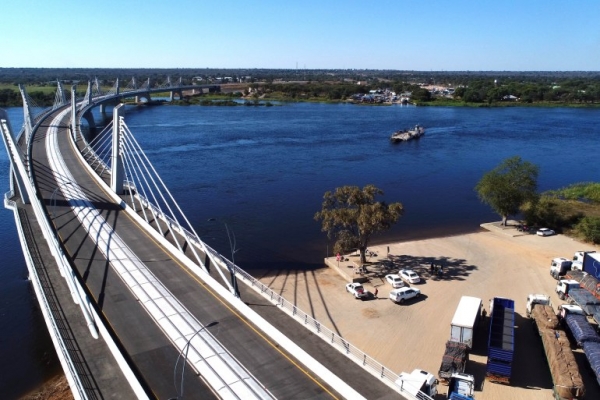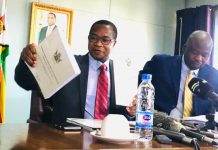
Sydney Kawadza & Talkmore Gandiwa
SADC member states will next week meet for the 9th River Basin Organizations/Shared Watercourse Institutions workshop to share information and experiences on inclusive trans-boundary water financing and collaborative development.
Stakeholders will also use the platform and share experiences for the realization of benefits of trans-boundary water co-operation and achieving sustainable industrial development
The workshop, to be held virtually via ZOOM on September 22-23, 2021, is aimed at promoting sustainable development through cooperation across shared waters.
The regional block is collaborating with the Zambezi Watercourse Commission (ZAMCOM) with the technical support of the Global Water Partnership Southern Africa (GWPSA).
The workshop will be held under the theme: “Promoting Inclusive and Collaborative Trans-boundary Water Financing for Sustainable Industrial Development”.
“The workshop aims to promote sustainable industrial development in SADC by fully realizing the benefits of cooperation across shared waters,” the SADC Secretariat said in a statement on Friday.
The RBOs and SWIs will share various experiences and efforts in the shared waters.
The event brings together representatives of RBOs/SWIs, SADC Member States, regional institutions, and other key sectors such as energy, food security and trade among others.
The SADC RBOs Workshops are biennial events convened by the SADC Secretariat with the aim of engaging with RBOs, who are seen as a vehicle for strengthening regional integration and cooperation.
The series of workshops further provides a platform for RBOs/SWIs to share experiences and learn from each other to build consensus on SADC’s strategic approach to support the efforts of member states with regards to the establishment, institutional development, and strengthening of RBOs, as well as other trans-boundary water resources development and management mechanisms in the region.
The SADC region has a population of over 340 million people, whose livelihoods are dependent on water resources, which are unevenly distributed over time and space.
Fifteen major river basins within the region are shared by at least two countries while 13 of the basins being located fully within the SADC region.
Trans-boundary water management in the region, therefore, presents a unique challenge. جريزمان
To guide joint development and management of the shared water resources SADC developed instruments of cooperation; the Revised SADC Protocol on Shared Watercourses, the SADC Regional Water Policy and the SADC Water Strategy.
Over the years, SADC has driven the implementation of these key instruments through the five-year rolling Regional Strategic Action Plans (RSAPs) on Integrated Water Resources Management (IWRM), within the framework of which SADC RBOs Workshops are implemented.
“This year’s workshop will increase collaboration between RBOs/SWIs for better sharing of experiences and water development through joint efforts while up-scaling stakeholders’ understanding of the sources and availability of finance for trans-boundary water financing.
“Through the workshop stakeholders will share successful basin-wide investment planning and financing (resource mobilization) for trans-boundary water projects as well as information, tools, and approaches to ensure inclusive and collaborative trans-boundary water investments,” the organizers said.
The 9th SADC RBO Workshop will be convened by ZAMCOM in collaboration with the SADC Water Division and the Global Water Partnership Southern Africa (GWPSA).
Base funding has been provided by the USAid Resilient Waters Program and the SADC-GIZ Trans-boundary Water Management in SADC (GIZ-TWM) Programme.
The workshop will be preceded by a Gender Session on September 21, 2021. بطولة اليورو 2023
The event is characterised by several sessions, consisting of different styles, which include plenary, panel discussion (reflections on the background paper presented), parallel and interactive sessions with the funders.
The Zambezi basin is an African drainage basin, whose main flow is the Zambezi River, being the fourth largest basin on the continent, in addition to being the most important basin in southern Africa. طاولة بوكر
The basin covers approximately 1,390,000 km², crossing regions with high population density, sometimes the basin spills into areas of low density, such as the Kavango–Zambezi Trans-frontier Conservation Area.
The ZAMCOM has been in existence since 2004 with the aim of strengthening cooperation in sharing its resources.
It covers Angola, Botswana, Tanzania, Namibia, Zambia, Zimbabwe, Malawi and Mozambique, being the main supplier of fresh water and electricity to the populations of these regions, mainly from the last five nations.
Two major sub-basins in the Zambezi basin and are interconnected with other major African systems include the Lake Nyassa/Shire River sub-basin, which connects with the Great Rift Valley and the perennial river bifurcation in the Selinda Spillway (or Magwegana river), in the Cuando River sub-basin, which connects the Zambezi Basin to the Kalahari Basin.
The SADC region’s River Basin Organizations and Shared Watercourse Institutions are quite instrumental as agents of peace-building, conflict-resolution and coordinated effort in the development and management of shared water resources, through ensuring equitable and reasonable utilization of shared waters











